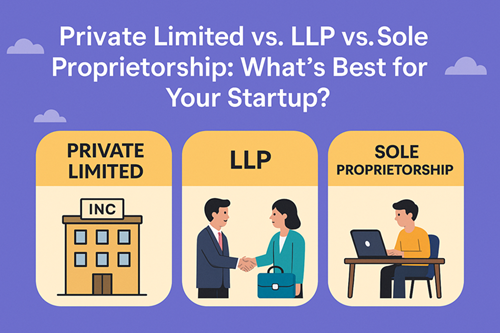So, you’ve got the next big idea that could shake up the world—or at least your industry—and you’re ready to go from coffee shop scribbles to a real business. Exciting stuff!
But wait… before you start printing business cards or ordering office plants, there’s one not-so-fun (but super important) thing to figure out: What business structure should you choose?
Should you go solo with a Sole Proprietorship? Bring in a co-founder and form an LLP (Limited Liability Partnership)? Or aim high and build a Private Limited Company?
Let’s break it down like a startup ninja, minus the boring legal jargon. Ready? Let’s roll.
👤 Sole Proprietorship: The “One-Man Army” Model
In one line: You are the business. No partners. No frills.
This is the easiest way to start a business. It’s literally you doing business as yourself. You don’t need fancy paperwork, just the right licenses and you’re good to go.
✅ Pros:
- Super Easy to Start – No complicated registrations.
- Full Control – You make all the calls.
- Low Compliance – Less paperwork, fewer rules.
❌ Cons:
- Unlimited Liability – If your business goes down, so does your personal savings.
- Hard to Raise Funds – Investors don’t usually fund sole proprietorships.
- Limited Growth – Scaling is hard when it’s just you.
Best for:
Freelancers, consultants, solo-run cafes, or side hustles.
🤝 LLP (Limited Liability Partnership): The “Best of Both Worlds” Model
In one line: You and your partner(s) run a business, but your personal assets stay safe.
An LLP is like a solid marriage between flexibility and protection. You get to run a business with others, share profits, and also not worry about losing your house if things go south.
✅ Pros:
- Limited Liability – Your personal stuff is safe.
- Flexible Structure – No strict rules about directors or shareholders.
- Less Compliance Than a Company – But still more structured than a sole proprietorship.
❌ Cons:
- Not Investor-Friendly – VCs usually prefer Private Limited Companies.
- Moderate Compliance – You’ll need to file annual returns and maintain books.
- Difficult Exit Strategy – Not as straightforward as selling company shares.
Best for:
Startups with 2–3 founders, professional firms (like lawyers, architects, or consultants), or any business where risk-sharing makes sense.
🏢 Private Limited Company: The “Startup-Ready” Model
In one line: A legit company with shareholders, directors, and the whole startup dream package.
This is the go-to structure for serious startups aiming for funding, rapid scaling, and brand credibility. It’s recognized by investors, government agencies, and even Shark Tank judges.
✅ Pros:
- Limited Liability – Your personal wealth stays separate.
- Great for Funding – Preferred by angel investors and VCs.
- Separate Legal Entity – The company exists beyond the founders.
- Better Branding – Having “Pvt. Ltd.” adds professionalism.
❌ Cons:
- High Compliance – Annual filings, audits, board meetings… yep, all that jazz.
- Costs More to Set Up and Run – Legal and professional fees can add up.
- Less Flexibility – You’ll need to follow the Companies Act.
Best for:
High-growth startups, tech companies, and founders eyeing outside investment.
🧠 How to Choose the Right Structure? Ask Yourself:
Here’s a quick self-check quiz (don’t worry, no grades):
- Am I going solo or with co-founders?
- Solo = Sole Proprietorship
- With partners = LLP or Pvt. Ltd.
- Do I need funding in the next 1–2 years?
- Yes = Private Limited
- No = LLP or Sole Proprietorship
- Am I okay with paperwork and legal formalities?
- Nope = Sole Proprietorship
- Somewhat = LLP
- Bring it on = Private Limited
- Is my personal risk tolerance low?
- Low = LLP or Private Limited
- High = Sole Proprietorship (but be careful!)
💼 Real Startup Scenarios (Just for Fun)
Case 1: Rahul the Developer
Wants to freelance, maybe take on small projects. He doesn’t plan to hire or scale (yet).
👉 Sole Proprietorship is perfect.
Case 2: Anita & Priya’s Design Studio
Two friends launching a boutique agency. They want shared ownership but not high compliance.
👉 LLP suits them well.
Case 3: Zeno Tech Pvt. Ltd.
A team of 3 is building an app with VC dreams. They need a strong structure and investor trust.
👉 Private Limited Company all the way.
📊 Quick Comparison Table
| Feature | Sole Proprietorship | LLP | Private Limited Company |
|---|---|---|---|
| Legal Status | Not separate | Separate legal entity | Separate legal entity |
| Liability | Unlimited | Limited to contribution | Limited to shares |
| Compliance | Low | Medium | High |
| Taxation | Individual rates | 30% flat rate | 25%/30% (based on turnover) |
| Investment Friendly | ❌ Nope | 🚫 Not ideal | ✅ Highly preferred |
| Easy to Scale | ❌ No | ⚠️ Somewhat | ✅ Yes |
| Ideal For | Freelancers, solopreneurs | Small firms, professionals | Startups & fast-growing businesses |
🏁 Final Thoughts: What’s Best for You?
If you’re just testing the waters or freelancing, start simple with a Sole Proprietorship.
If you’re building a business with friends and want structure without the corporate headache, try an LLP.
But if you’re chasing funding, looking to scale, and mean serious business—go with a Private Limited Company.
Whatever you choose, remember: it’s easier to switch up later than to fix a mess. So think long-term, but don’t let the structure stop you from starting.

